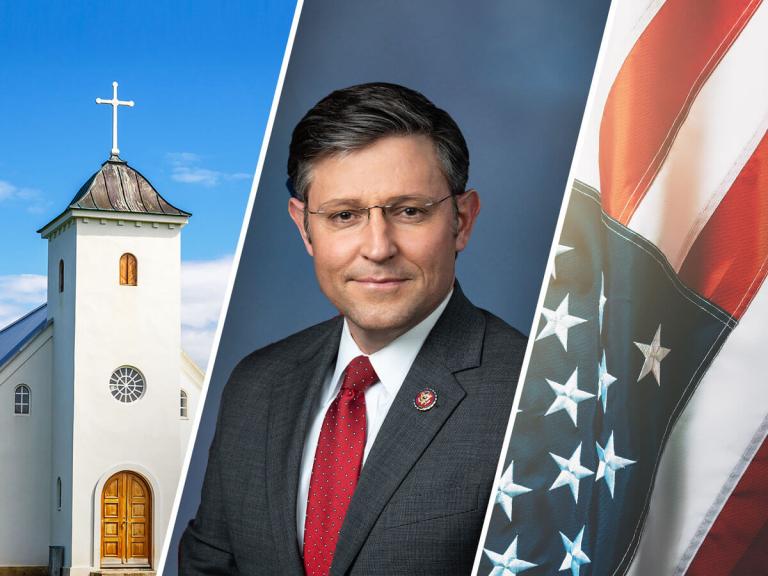
House Speaker Mike Johnson has found himself under scrutiny from critics again after speaking with CNBC’s Squawk Box on the separation of church and state. Johnson had appeared on the show to discuss the upcoming budget vote when he found himself responding to questions about an image of himself praying on the floor of Congress with other representatives and how that impacts the doctrine of separation of church of state. Johnson responded that the founding fathers wanted a “vibrant expression of faith in the public square.” He then went on to say that “separation of church and state” is a “misnomer.” “People misunderstand it. Of course, it comes from a phrase that was in a letter that Jefferson wrote. It’s not in the Constitution,” he said. “What he was explaining is they did not want the government to encroach upon the church, not that they didn’t want principles of faith to encroach on our public life. It’s exactly the opposite.” The speaker’s claim was quickly latched on to by his critics. The Guardian, when reporting the comment, referred to Johnson as a “Christian nationalist House speaker.” “The second-in-line to the presidency informed Americans on Tuesday that their time-honored conception of one of the founding principles of the country was a ‘misunderstanding,’” the tongue-in-cheek article went on.
The phrase “separation of church and state” has been a source of contention between liberals and conservatives for decades. As Speaker Johnson stated, the term is not directly found in the US Constitution but in a letter written by Thomas Jefferson in 1802 to the Danbury Baptist Association. In the letter, Jefferson termed the phrase while discussing the establishment clause of the First Amendment, writing, “I contemplate with sovereign reverence that act of the whole American people which declared that their legislature should ‘make no law respecting an establishment of religion, or prohibiting the free exercise thereof,’ thus building a wall of separation between Church & State.” The phrase then found itself in US law in 1947 in the US Supreme Court decision Everson v. Board the Education. In that decision, the Supreme Court wrote, “The ‘establishment of religion’ clause of the First Amendment means at least this: Neither a state nor the Federal Government can set up a church. Neither can pass laws which aid one religion, aid all religions or prefer one religion over another. Neither can force nor influence a person to go to or to remain away from church against his will or force him to profess a belief or disbelief in religion.” Since that decision, the application of the Establishment Clause has expanded, resulting in the 1962 Supreme Court case Engel v Vitale, where prayers in school were determined to be unconstitutional.
Such decisions, however, have increased the tension between the establishment clause of the First Amendment and the “free exercise clause” of that same amendment, which states that while Congress cannot establish a federal religion, neither is it allowed in “prohibiting the free exercise thereof.” Thus, when high school football coach Joe Kennedy was fired from his school for praying on the football field after school hours, the Supreme Court stepped in once again, siding with Kennedy. Yet not every case sides with the religious defendant, further muddying exactly how to apply the First Amendment. Johnson is also not the first to state that Americans misunderstand “separation of church and state.” In 2010, political thinker and author Thomas Sowell wrote an op-ed for The National Review on the separation of church and state. Noting how the phrase is so intricate to American thought that most people believe it does appear in the Constitution, Sowell wrote that the phrase “was used in a letter by Thomas Jefferson, who was not even in the country when the Constitution was written. It was a phrase seized upon many years later by people who wanted to restrict religious symbols, and it has been cited by judges who share that wish.” He added that “an establishment of religion” referred to how the Church of England was the established church of the founders’ time, with members gaining special privileges sanctioned by the government. “The people who wrote the Constitution of the United States had been British subjects most of their lives and knew exactly what an ‘established church’ meant. They wanted no such thing in the United States of America. End of story — or so it should have been,” Sowell wrote.
